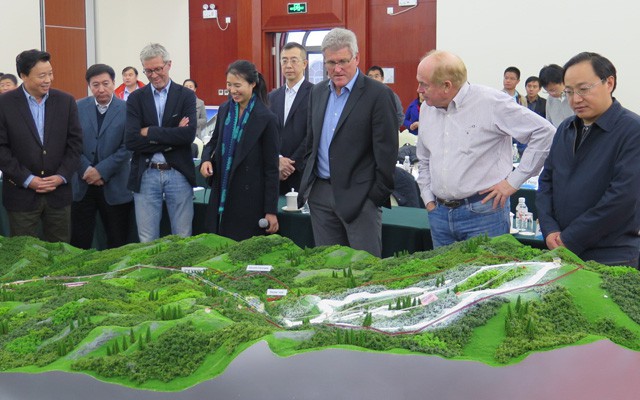
ECOSIGN is on hand in Beijing for the final submission of the Beijing bid in 2014, a year before it came out on tops to host the 2022 Winter Olympics.
It doesn’t need to snow a lot in China in order for the country to host a winter Olympics.
That much is clear after Beijing’s bid came out tops in a tight two-way race for the 2022 Winter Olympic Games. The decision, coming down to a close 44 to 40 vote, was announced by the International Olympic Committee (IOC) in Kuala Lumpur on Friday, July 31.
“Generally in China ski areas have 100 per cent snowmaking,” said Don Murray, senior vice president of Ecosign, the Whistler-based mountain resort planning company that helped developed the successful Olympic bid.
“I watched the presentation by both Almaty (Kazakhstan) and Beijing and Almaty was bragging about their powder snow. Well, we all know very well that racecourses aren’t built on powder snow… The snowmaking snow is good and dense and forms a good base for race courses.”
And there’s no question that it gets cold enough in the snow cluster region in Chongli County, close to the city of Zhangjiakou and three hours from Beijing, to keep those snow machines running.
“Temperature is not an issue,” added Murray.
Beijing’s win is a huge coup for the local company, which has worked on six Olympic Games and has been active in China for many years developing ski resorts. Murray, for example, has travelled to China 44 times in the last 15 years and has seen Beijing’s rapid transformation in that time. A noticeable change came on the heels of the 2008 summer Games there, with the city becoming much more open in terms of catering to foreign tourists.
Beijing is now the first city to host both the summer and winter Games. The 2022 Games is expected to foster winter sports in the country.
Ecosign helped the Beijing bid committee on the conceptual planning for the 2022 bid.
The next phase is the more detailed planning and they hope to remain involved.
Ultimately, said Murray, a successful winter Games in China will be good news for Whistler, which has been actively advertising there to capitalize on the growing middle class and the increasing access to travel around the world.
“I think it’s a great opportunity especially for a country like China having such a large population, and the population now is diversifying into other recreational activities,” said Murray. “This will be a good impetus to have people partake in winter sports. In the long term it will positively effect Whistler and the British Columbia ski industry too because those people will ultimately want to travel the world, and we have a fantastic product here.”
Ecosign’s winter Olympic work began in the lead up to the 1988 Calgary Games and continued on with the Salt Lake Games in 2002 and then the big event in its own backyard in 2010.
“As we did that we developed relationships with FIS, with people in the IOC,” said Murray. “They know that our designs work. They have a great deal of confidence in what we do and I think that has had a long-term effect — when they see a plan from us, they know what they’re going to get.”
The company is now at work in South Korea doing the very precise detailed grading of the soil for the snowboard and freestyle competitions. The PyeongChang Games will take place in 2018.
When asked what Beijing’s biggest challenge will be, Murray did not mention the snow, or the distance between venues, criticized for being so far away from each other. He did not mention China’s human rights record, which has also come under scrutiny with the IOC’s decision.
The biggest challenge for Beijing, he said, is the biggest challenge for any Games: getting everything built on time. While there are plans to re-use some of the summer venues in Beijing, the alpine skiing site and the Nordic venue will be built from scratch.
Murray added: “We’re ready for it.”

